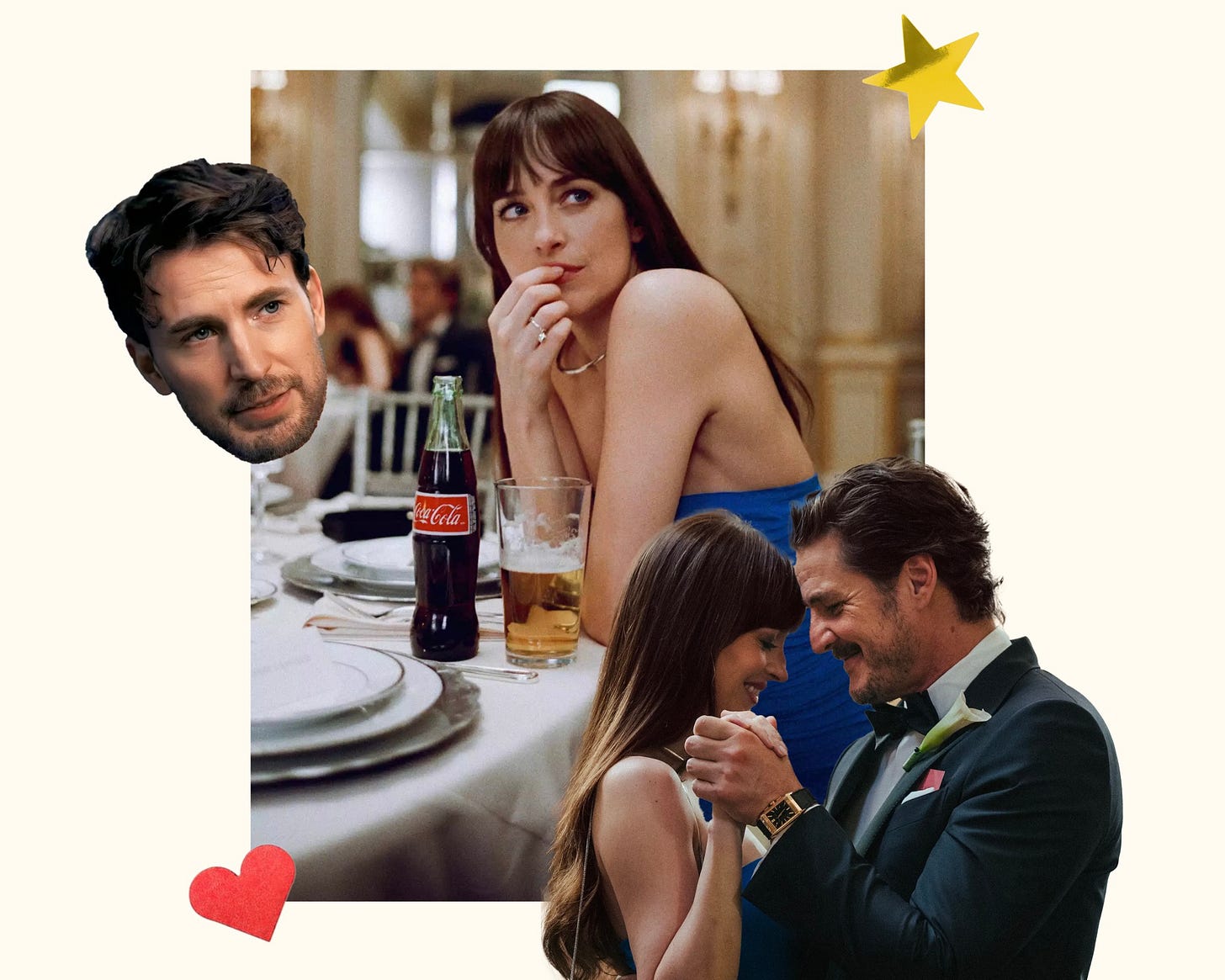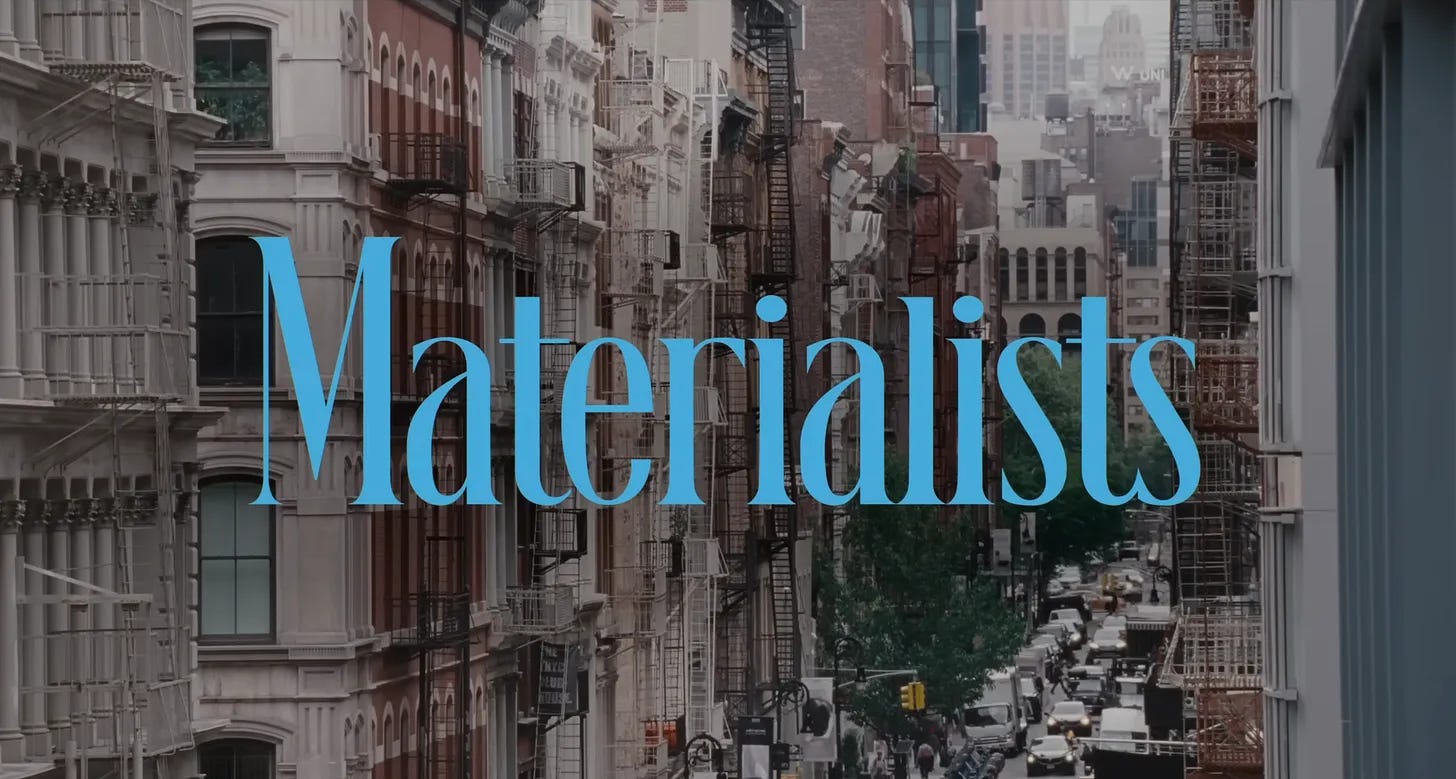We’re so back: So sorry to Celine Song, but I disagree with her…
Why I can’t stop thinking about The Materialists.
I Just Want To Talk took an unexpected hiatus because, as it turns out, I just didn’t want to talk. I don’t know what it is about summer that manages to turn me upside down each year, but I keep thinking about Georgia O’Keeffe telling fellow painter Russell Vernon Hunter in a letter, “I have done nothing all summer but wait for myself to be myself again.” That’s how summer tends to feel for me, like a season I just need to get through. Everyone’s usually away from the city, everything is quiet, and my mind runs rampant. But now it’s August 19, things are picking up again, and I’m back to living. (Please note: I reserve the right to crash out again.)
Here’s what’s been on my mind recently…
I was excited when director Celine Song released the preview for The Materialists. I loved her last film Past Lives. I also unabashedly love rom-coms, and the trailer—intentionally—made it seem like one. Then I saw it, and I left the theater so frustrated that, after ranting to my friend about how ridiculous I found it, I didn’t want to engage with it anymore. The characters felt underdeveloped. The last 15 minutes seemed illogical compared to the earlier hour and 42 minutes. (And there’s also a leg-lengthening surgery plotline I simply will not—cannot—get into.)
The movie centers on Lucy (Dakota Johnson), a successful—and cynical—30-something New York matchmaker torn between wealthy Harry (Pedro Pascal) and her ex-boyfriend, John (Chris Evans), a struggling 37-year-old actor. Lucy repeatedly talks about the importance of financial stability after growing up with parents who always argued about money. In one flashback, she and John fight on their fifth anniversary as he refuses to pay $25 for parking because he can’t afford it. Lucy realizes she’s unhappy being in a relationship where both of them are broke. Later, she dates Harry, a private equity guy with a $12 million apartment. (They meet at a wedding where she also runs into John, who is working the party.) She doesn’t love Harry, but he seems to check off every item on her checklist.
And please believe me, I’m not saying she should have stayed in a loveless relationship for money. But I was shocked when the film ended with Lucy choosing John, because absolutely nothing had changed. John was still a struggling actor, and Lucy was still Lucy. Meaning? The whole film had been rooted in the idea that love sometimes—and as much as you may want it to—just isn’t enough, particularly when it comes to living comfortably (a loose term, but run with me here) in a place like New York City. It was dark and uncomfortable but realistic, so why was I meant to be okay with—or believe—that Lucy would suddenly accept a man who wasn’t moving toward being the kind of partner who could at least meet her halfway? Why was love suddenly being treated like a magical force that could overcome everything when we’d spent most of the movie hearing Lucy talk about her financial trauma?
I gaslit myself into thinking maybe I hadn’t understood it, maybe I missed something. Surely Celine knew better than me? In any case, I pushed it to the back of my mind and went on with my life.
That was until a Refinery29 clip started circulating where an interviewer told Celine Song, “I read a Letterboxd review that really made me laugh. [It said], ‘Not Celine promoting broke men in this economy.’” The interviewer emphasized again that the review “really made me laugh” before asking what she thought. Celine answered:
It doesn't make me laugh because it really is disappointing to me. There is a very real confusion about feminism and the history of feminism. Through intersectionality, so much of feminism has been about anti-corporate and anti-capitalist, and of course, it was always at the forefront of fighting classism. So, I’m very concerned about the way that we talk about people who are poor. The thing that’s very important to me is to stress that poverty is not the fault of the poor, and given that, it is very brutal [and] I find it very cruel to talk about John as a character … in such cruel terms as ‘broke boy’ or ‘broke man.’ There is something about that, the classism of that the kind of hatred of poverty, hatred of poor people, that is a very troubling result of the way that the wealthy people have gotten into our hearts about how it’s your fault if you're poor, and you're a bad person if you're poor. So, it doesn’t make me laugh, actually. The whole movie is about fighting the way that capitalism is trying to colonize our hearts and colonize love.*
First of all, oof. If I were the interviewer, I might have cried after emphasizing I laughed—twice—only to have Celine respond like this. And by the way, Celine is (mostly) right. It is true that being poor is not the fault of the poor—or a measure of a person’s worth or moral standing. It is troubling how we as a society talk about poor people. It is troubling that capitalism has colonized the notion of love.
My issue with her response is that we’re meant to take all of this away from a film that frankly didn’t do a good job of driving the idea home. Financial trauma is real—very real—and I don’t think it’s unfair for someone to want financial stability and a partner who can help them achieve it. (I know there’s a larger discussion here, because what is “enough” looks different for different people, especially in one of the most expensive cities in the world.)
Not only that, John is played by Chris Evans, a cisgender, straight, white male. There are certainly systems that keep people oppressed, but he has every advantage on his side. And while I believe artists deserve to be compensated fairly, his character seemingly wanted Lucy to accept that love would be enough without changing anything at all. When he asks Lucy to marry him, he says, “How’d you like to make a very bad financial decision?” Am I supposed to find that charming? Romantic? Funny? Lucy apparently did… But again: How am I supposed to root for this relationship—or even believe it could work—when the initial issue is still there? Why is Lucy suddenly happy to go along with that? This would be a different discussion if, throughout the film, we saw John at least trying. But we didn’t.
It feels like there’s a disconnect between the movie Celine says she made and the one she actually delivered. Ironically, I think her point—that capitalism is colonizing love—would have landed harder if Lucy had married Harry. She would have been financially secure but not in love, a literal example of capitalism winning.
It’s inevitable that we project our own lives onto the media we consume, but I couldn’t stop thinking about my parents—Mexican immigrants who sacrificed their goals, their wants, even their home country, in order to build a more financially secure future. That kind of compromise is real, and it’s painful to watch a director—a woman of color, no less—dismiss valid criticism of a character like John, who refuses to compromise at all.
I think I need to push this back to the recesses of my mind again… at least until someone else makes the mistake of bringing it up at dinner.
x DB








100% all of this. I also feel like Celine responded to that review with the assumption that the joke was about Lucy choosing a broke man over a rich man, but she entirely ignored the fact that Lucy also chose a broke man over HERSELF. Capitalism has colonized love because it first colonized us - we have to survive in this world so why would we make it harder for ourselves by adding an unnecessary financial dependent? That’s the more interesting angle in my opinion! To your point, whether she’d married the rich guy or rejected both of them, either alternative would’ve made her thesis more clear. The “love conquers all” ending is not a new idea…
I agree! Also I was bothered on how they handled the subplot where Lucy's client was sexually assaulted and stalked.